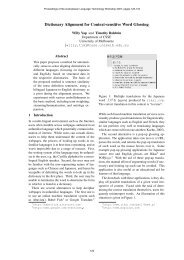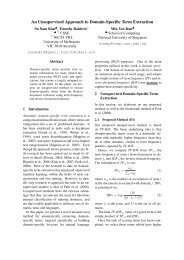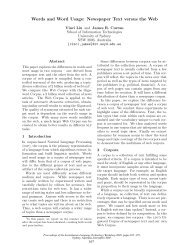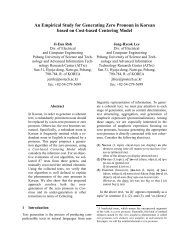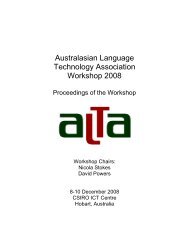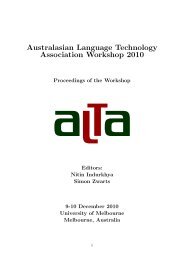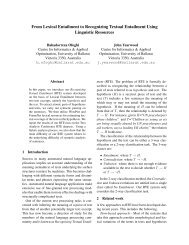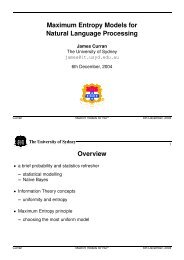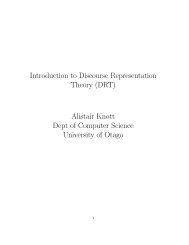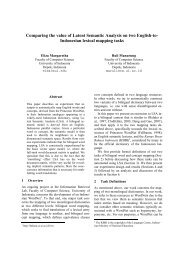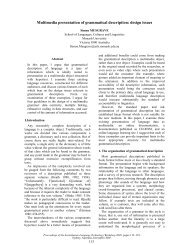Full proceedings volume - Australasian Language Technology ...
Full proceedings volume - Australasian Language Technology ...
Full proceedings volume - Australasian Language Technology ...
You also want an ePaper? Increase the reach of your titles
YUMPU automatically turns print PDFs into web optimized ePapers that Google loves.
Rock Hip-Hop Electronic Punk Metal Pop Alternative Folk<br />
day away way day stay away da na night light sha la sha la la da<br />
way day way say day away day away la da way say insane brain light night<br />
say away right night control soul say away day away feel real alright tonight day say<br />
night light good hood say way day way real feel say ok little pretty hand stand<br />
way say away day getting better way say near fear said head write tonight away day<br />
stay away dead head way day play day say away oh know know oh wave brave<br />
night right feel real night right day say head dead say day way say stride fried<br />
way away little bit say away way away soul control la da la da head dead<br />
oh know say play heart start head dead high sky right night said head sunday monday<br />
da la pretty little light night bed head eyes lies sha na real feel radio na<br />
Table 3: Genre specific top ten rhyme pairs ranked by tf-idf.<br />
4.5 Collocations<br />
All possible trigrams were extracted from<br />
the LyricWiki collection and Gutenberg texts.<br />
Again, tf-idf was used to rank the trigrams,<br />
with a second list removing trigrams containing<br />
terms from the NLTK list of English stopwords<br />
(Bird et al., 2009) and repeated syllables<br />
such as ‘la’. Table 4 provides a comparison<br />
of these techniques with raw frequency<br />
weighting. Similar attempts using techniques<br />
such as Pointwise Mutual Information, Student’s<br />
t-test, the Chi-Squared Test and Likelihood<br />
Ratio (Manning and Schütze, 1999) did<br />
not yield promising ranked lists and are not<br />
included in this paper.<br />
From Table 4, we can see that the difference<br />
between frequency and tf-idf in the top<br />
fifteen are both positional changes and the introduction<br />
of new terms. For example, ‘i love<br />
you’ is ranked fifth by frequency, but fifteenth<br />
using tf-idf. Also note how phrases such as<br />
‘its time to’ and ‘i just wanna’ rank higher<br />
using tf-idf. This shows the influence of the<br />
Gutenberg texts - common English phrasing<br />
is penalised and lyric-centric terminology emphasised.<br />
Interestingly, the filtered tf-idf scores ‘ll cool<br />
j’ the highest. This is the name of a rapper,<br />
whose name appears in 136 songs within our<br />
collection. Hirjee’s work involving hip-hop<br />
lyrics found that rappers have a tendency to<br />
‘name-drop in their lyrics, including their own<br />
names, nicknames, and record label and group<br />
names’ (Hirjee, 2010). Examining these lyrics,<br />
we determined that many of these occurrences<br />
can be attributed to this practice, while others<br />
are annotations in the lyrics showing the<br />
parts performed by LL Cool J which we did<br />
not remove prior to experimentation.<br />
Substituting document frequency for term<br />
frequency in the lyric collection, as in Table<br />
Decade Collection<br />
2000 - 2010 55.41%<br />
1990 - 2000 33.49%<br />
1980 - 1990 7.08%<br />
1970 - 1980 2.88%<br />
1960 - 1970 0.52%<br />
Table 7: Time distribution of lyrics.<br />
6, decreases the weight of trigrams that occur<br />
repeatedly in fewer songs. As a result, this ‘dfidf’<br />
should increase the quality of the ranked<br />
list. We see that the syllable repetition is<br />
largely absent from the top ranking terms and<br />
among other positional changes, the phrase<br />
‘rock n roll’ drops from second place to thirteenth.<br />
Several interesting trends are present in Table<br />
5, which shows df-idf ranked trigrams by<br />
genre. Firstly, Hip-hop shows a tendency<br />
to use coarse language more frequently and<br />
genre-specific phrasing like ‘in the club’ and<br />
‘in the hood’. Repeated terms as in ‘oh oh<br />
oh’ and ‘yeah yeah yeah’ were more prevalent<br />
in pop and rock music. Such vocal hooks<br />
may be attempts to create catchy lyrics to sing<br />
along to. Love appears to be a common theme<br />
in pop music, with phrases like ‘you and me’,<br />
‘youre the one’ and of course, ‘i love you’ ranking<br />
high. This terminology is shared by the<br />
the other genres to a lesser extent, except in<br />
the cases of hip-hop, punk and metal, where<br />
it seems largely absent. The term ‘words music<br />
by’ within the metal category is the result<br />
of author attribution annotations within the<br />
lyrics.<br />
4.6 Time<br />
There is a temporal component to clichés.<br />
There was probably a time when the lines<br />
“I’m begging you please, I’m down on my<br />
91



